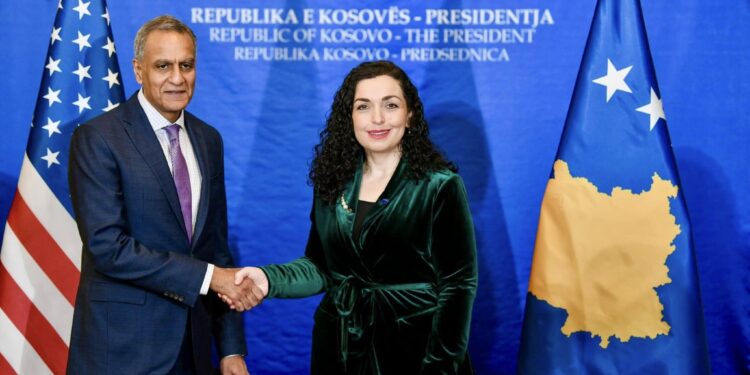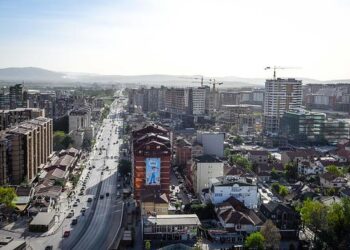The United States has announced the suspension of its diplomatic dialogue with Kosovo, citing recent government actions that it warns may escalate tensions and fuel instability in the region. In a statement released by the U.S. State Department, officials expressed deep concern over moves by Kosovo’s leadership, underscoring the need for restraint and constructive engagement to maintain peace and security in the Balkans. This development marks a significant setback in ongoing efforts to resolve long-standing disputes between Kosovo and Serbia, raising questions about the future trajectory of international mediation in the area.
US Suspends Dialogue with Kosovo Citing Government Actions That Fuel Regional Instability
The United States has officially paused its diplomatic engagement with Kosovo, attributing the decision to recent government actions perceived as exacerbating tensions in the Balkans. Washington expressed deep concern that policies implemented by Pristina are undermining regional stability, complicating long-standing efforts to foster peace and cooperation between Kosovo and its neighbors. The suspension signals a critical juncture in U.S.-Kosovo relations amid fears that escalating political maneuvers could reignite ethnic and territorial disputes.
Among the key issues cited by U.S. officials are:
- Unilateral administrative measures affecting northern Kosovo’s Serb-majority communities
- Legislative moves perceived as exclusionary toward minority groups
- Increased nationalist rhetoric by government representatives
These developments have prompted calls for dialogue, but until substantive changes occur, Washington’s stance remains firm. A comparative look at recent government initiatives highlights the shifting dynamics:
| Action | Implication | Status |
|---|---|---|
| License Revocations in Northern Municipalities | Disrupts economy, fuels resentment | Active |
| New Language Policy in Public Schools | Limits minority language use | Under Debate |
| Increased Security Presence | Seen as intimidation tactic | Ongoing |
Impact of Kosovo’s Political Moves on Western Balkans Peace and Security
The recent suspension of diplomatic dialogue by the United States marks a significant setback in efforts to stabilize the Western Balkans. Washington’s decision stems from concerns that the Kosovo government’s recent policies are exacerbating regional tensions rather than alleviating them. According to US officials, these moves risk undermining delicate peace arrangements, fueling uncertainty not only within Kosovo but across neighboring countries where ethnic and political fault lines remain fragile.
Key ramifications of this development include:
- Increased diplomatic isolation of Kosovo on the international stage, complicating alliances with Western partners.
- Heightened risk of renewed ethnic clashes, particularly in Serb-majority areas in northern Kosovo.
- Potential derailment of EU-led mediation efforts aimed at normalizing relations between Kosovo and Serbia.
| Stakeholder | Impact | Potential Response | |||||||||
|---|---|---|---|---|---|---|---|---|---|---|---|
| Kosovo Government | Diplomatic pressure and reduced support | Reassess policies, seek renewed dialogue | |||||||||
| Serbian Authorities | Increased nationalist rhetoric | Leverage international mediation | |||||||||
| European Union | Challenges to peace process It looks like the table in your content is incomplete-specifically, the row for the “European Union” stakeholder is missing some details under “Impact” and “Potential Response.” Here’s a suggested completion based on the context provided: | ||||||||||
| European Union | Challenges to peace process and mediation efforts | Intensify diplomatic engagement and facilitate dialogue |
| Focus Area | Recommended Actions | Expected Outcome | |||||||||
|---|---|---|---|---|---|---|---|---|---|---|---|
| Political Dialogue | Bilateral talks mediated by EU or UN representatives | Renewed trust and agreement on governance issues | |||||||||
| Economic Cooperation | Joint infrastructure and trade initiatives | Improved livelihoods and reduced tensions | |||||||||
| Community Engagement | Inclusive forums and cultural exchange programs | To reestablish productive dialogue, all parties must prioritize transparency and inclusivity, ensuring that community voices on both sides are heard and respected. This approach can rebuild trust and ease tensions that have escalated recently.
Furthermore, stabilization requires a comprehensive approach addressing socio-economic factors contributing to unrest. Investment in community development and cross-border initiatives can foster shared interests and reduce conflict drivers. The table below outlines a potential framework for stabilizing efforts:
|















